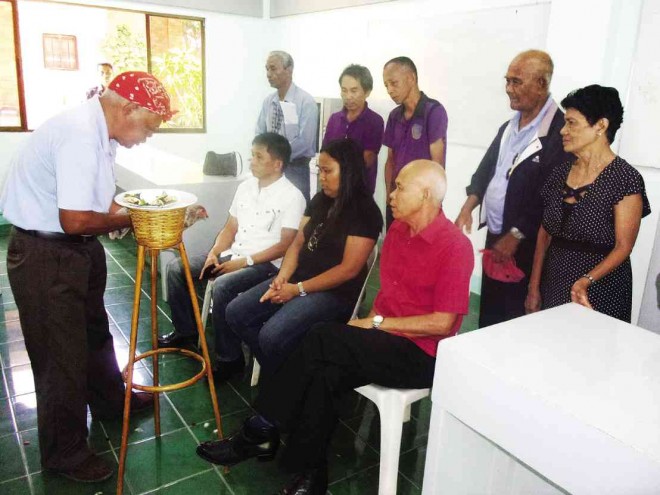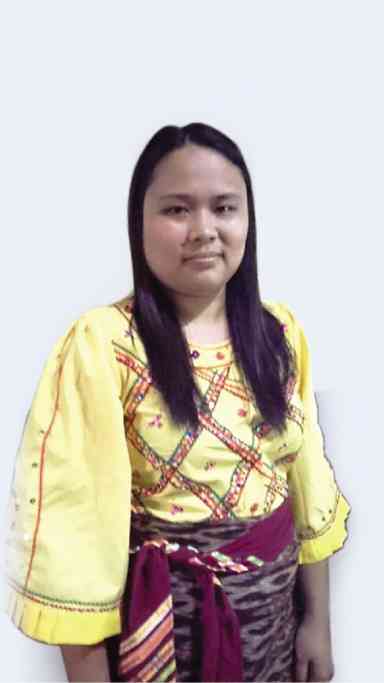Pride of the tribe

DELFIN conducts the “pamaas” for Paz (seated, middle), attended by Asicam (to her left) and other elders.
Ivyrose Bayawan Paz admits she did not know much about her mother Emillana’s indigenous community.
Manobos are described by some anthropologists as proto-Philippine or proto-Austronesian people found mostly in areas that straddle the boundaries of Agusan, Bukidnon, Cotabato, Davao and Misamis Oriental.
Paz, who was born in the town of Makilala, Cotabato, and grew up in Kidapawan City, the province’s capital, says, “I did not know the language. I was not very familiar with my mother’s culture. I was not so immersed in the Manobo tradition, ceremonies, rituals.”
She only met her maternal relatives when they came to visit or on special occasions.
While Paz knew little about her Manobo roots, she knew very well what she was going to be. Her mother is a retired court stenographer while her late father Teresito, an Ilonggo-Tagalog, was a court interpreter.
Article continues after this advertisementPaz, the only girl of four children, decided early on she was going into law.
Article continues after this advertisementShe took up Bachelor of Arts in Psychology, as somebody advised her it was the best preparation for law school, graduating cum laude in 2010 from the University of Southern Mindanao in Kabacan, Cotabato. But a law education and the bar exam review classes were expensive.
Paz thought she would work first and save money for her schooling. She worked as a call center agent in Manila but found she could not save money. “Magastos (It was expensive),” she says, especially since she had to pay rent to be near her workplace.
Her eldest brother, who works as a computer programmer in Dubai, asked her to wait until he was able to save enough to pay for her law studies.
Then Paz heard of the scholarship program of the Mount Apo Foundation Inc. (Mafi). Applicants only need to be 25 percent Manobo. Paz is 50 percent Manobo, a
descendant of datus on her mother’s side.
Mafi is a nonstock and nonprofit corporation that seeks to empower upland dwellers and cultural communities. It is supported primarily by the Environmental and Tribal Welfare Trust Fund, which comes from the one centavo for every kilowatt-hour of generated power from the Mt. Apo Geothermal Plants operated by the Energy Development Corp.
Committed “to achieve the total development of all upland dwellers and cultural communities within and around Mount Apo Natural Park,” Mafi’s Educational
Development Program has become a flagship project, providing educational opportunities through college, technical-vocational, master’s and law scholarship grants, and financial assistance to high school students around Mt. Apo.
With her scholarship, which also covered bar review classes, Paz says, “I learned more about the Manobo” and her interest in her ancestry was raised. At the Ateneo de Davao University College of Law, she says, she studied closely the Indigenous Peoples’ Rights Act of 1997, the issue of ancestral domain and civil laws pertaining to the Philippines’ indigenous communities.
For Paz, now a full-fledged lawyer, achieving her dream has taken her back to her Manobo roots, introducing her to the community’s traditions and rituals.
With Mafi executive director Datu Samuel M. Asicam Sr. in attendance, Datu Lamberto Delfin conducted the pamaas, a Manobo ritual to send someone off on a safe and happy trip, for good luck and in thanksgiving, before she took the bar exam.
Although the scholarship does not require her to do anything for her community, Paz says, “I have to give back.” She has applied with the National Commission on Indigenous People (NCIP) but she does not expect to start work among her fellow Manobos, as the position has been filled.
Most likely, she says, she will be dealing initially with B’laans and T’bolis, indigenous communities that also occupy parts of the Cotabato provinces.
As she waits to start work with the NCIP, Paz helps fellow Manobos with their legal problems.
“Most cases involve ancestral domain issues,” says Paz, only the second member of the Manobo community to become a lawyer.
The first Manobo lawyer, Datu Juan “Jhonny” Guabong Sibug, who died in 2006, rose from being a municipal councilor to mayor of Kidapawan. He was elected assemblyman for two terms of the Autonomous Region in Muslim Mindanao representing Cotabato province.
Now, being the only lawyer of her indigenous community, Paz has become, according to Mafi project officer Rodel Ebboy, “the pride of the Manobo.”
